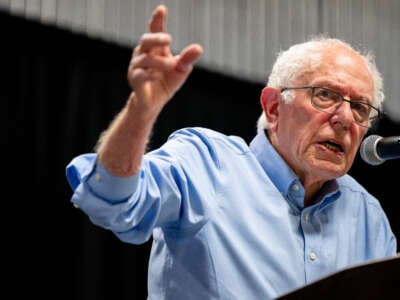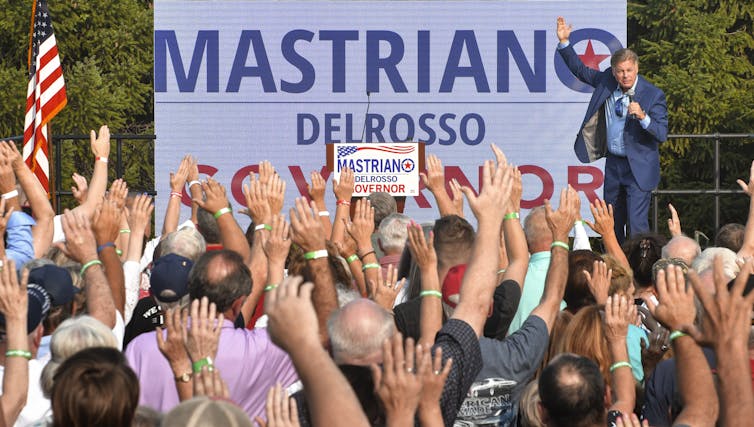The Ohio Democrat lost his seat because "the billionaire-backed crypto industry donated $40 million to his right-wing opponent," lamented one labor journalist.

Republican Sen.-elect Bernie Moreno arrives to address supporters on November 4, 2024 in Brecksville, Ohio.
Photo by Stephen Maturen/Getty Images
Jake Johnson
Nov 07, 2024
COMMON DREAMS
The Republican Party's capture of the U.S. Senate this week was made possible in part by massive spending from the nascent but increasingly influential cryptocurrency industry, which pumped more than $40 million into a successful effort to topple pro-worker progressive Sen. Sherrod Brown in favor of luxury car dealer Bernie Moreno.
Crypto industry spending helped make Ohio's closely watched Senate race the most expensive in the state's history, with Moreno's campaign boosted by around $40.1 million from the super PAC Defend American Jobs—part of what OpenSecrets described as the "triad" of allied pro-crypto groups pouring cash into the 2024 election.
The Washington Postnoted that Moreno "founded a blockchain firm called Ownum in 2018" and "has long immersed himself in blockchain technology, a registry of ownership that essentially underpins all cryptocurrency."
A spokesman for Fairshake, another member of the crypto PAC triad, took credit for Moreno's victory in a statement after the election was called in the Republican's favor and condemned Brown's support for regulating the industry. Fairshake received tens of millions of dollars in donations from the cryptocurrency exchange giant Coinbase—some of which may have been illegal spending, according to the watchdog group Public Citizen, given that the company is a federal contractor.
"Sherrod Brown was a top opponent of cryptocurrency and thanks to our efforts, he will be leaving the Senate," said Fairshake's Josh Vlasto. "Senator-elect Moreno's come-from-behind win shows that Ohio voters want a leader who prioritizes innovation."
Crypto executive Tyler Winklevoss boasted in a social media post, "The crypto army is striking!"
"Sherrod Brown—crypto public enemy, Elizabeth Warren co-conspirator, and Gary Gensler crony—was just ousted by Bernie Moreno for Ohio Senate," wrote Winklevoss, the co-founder of Gemini.
Labor reporter Steven Greenhouse wrote Wednesday that it is "obscene" that Brown lost his seat because "the billionaire-backed crypto industry donated $40 million to his right-wing opponent."
"Sherrod Brown is one of the most pro-worker, pro-middle-class members of the U.S. Senate," Greenhouse added. "He truly fights for workers."
"The strategy was a brazen attempt to buy influence while keeping the public unaware of what they were supporting."
While the Ohio Senate contest was "the biggest single target of crypto money this cycle," as CNBCput it, the industry spread its money widely, backing both Republicans and Democrats in races across the country—underscoring its attempt to gain influence over future regulatory fights in Congress.
Overall, crypto groups spent more than $130 million in support of candidates for federal office this cycle. A tracker created by the Stand With Crypto Alliance estimates that 263 "pro-crypto candidates" were elected to the House and 18 to the Senate in Tuesday's contest.
Former President Donald Trump's victory over Vice President Kamala Harris was also seen as a win for the industry, with Bitcoin's price spiking to a new all-time high on Wednesday. During his campaign, Trump vowed to make the U.S. "the crypto capital of the planet."
"Tonight the crypto voter has spoken decisively—across party lines and in key races across the country," gushed Brian Armstrong, the CEO of Coinbase. "Americans disproportionately care about crypto and want clear rules of the road for digital assets. We look forward to working with the new Congress to deliver it."
But one critic, Better Markets president Dennis Kelleher, cast doubt on the industry's self-serving narrative that the 2024 results amounted to a ringing endorsement of cryptocurrency.
In an op-ed for the San Francisco Chronicle on Thursday, Kelleher pointed out that pro-crypto PACs adopted "generic anodyne names" and bankrolled ads that didn't even mention cryptocurrency.
"It's as if Ford ran an ad campaign and never mentioned its cars," Kelleher wrote. "The strategy was a brazen attempt to buy influence while keeping the public unaware of what they were supporting. This way, the industry can claim the now-elected officials they backed have a mandate from the public to support crypto interests—even though they don't."


.jpg)






















